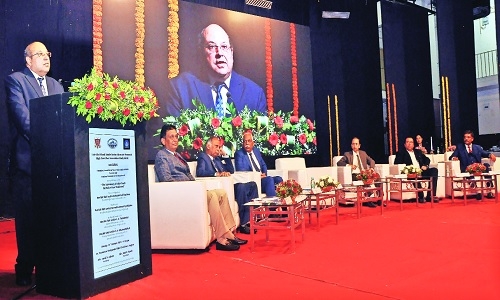War crimes UN must define charter
| Date :16-Oct-2023 |

Staff Reporter
Justice Rohinton F Nariman, former Judge, Supreme Court of India, shared profound insights on the historic Nuremberg and Tokyo Trials on Sunday. He suggested that the United Nations (UN) must establish a charter that outlines what constitutes war crimes and stressed the importance of involving judges from neutral countries to prevent inherent bias in the decision-making process. Justice Nariman also suggested that victors should not solely determine these matters. The lecture by Justice Nariman shed light on the enduring significance of these trials and their implications for justice, war crimes and the pursuit of universal peace in the future. Justice Nariman, while addressing the legal fraternity, highlighted three key trends that emerged during these landmark trials. He underscored that Italians and the head of the Japanese Government were not arraigned due to what he referred to as “completely arbitrary prosecution.” He also suggested that pragmatic reasons might have played a role in this omission and pointed out a significant flaw in the process. Justice Nariman further stressed that the victims of these war crimes were not given the opportunity to present their cases.
He went on to express a utopian hope for the future and suggested that the ideals of universal world peace might become a reality. He thanked the efforts of great persons like Justice Radha Vinod Pal, who was one of three Asian judges appointed in the Tokyo Trials. During his lecture, Justice Nariman provided a comprehensive historical overview of both the Nuremberg and Tokyo Trials. He highlighted the pivotal role played by Justice Jackson in the Nuremberg Trials, mentioning that one year of his justiceship was dedicated to these trials. Justice Jackson was not only known for his dissent but also for his landmark judgments and the literary quality of his legal language. Justice Nariman discussed the formation of the Nuremberg Trials Charter, which was unprecedented in its approach. This charter established a military tribunal consisting of judges from each victorious country. The judges were responsible for determining the fates of the accused and cross-examination was allowed during the proceedings. In the Nuremberg Trials, 12 accused received the death penalty, three were sentenced to life imprisonment, and three were acquitted. The Tokyo Trials, on the other hand, saw 16 accused sentenced to life imprisonment and seven receiving the death penalty.
Despite dissenting judgments, they were ultimately signed as majority judgments. Justice Nariman also noted two dissenting opinions, one from a Dutch judge and another from India’s own Justice Radha Vinod Pal, who authored a 1,200-page judgment. Justice Pal argued that Japan may have been waging a war against colonialism imposed by Western powers and pointed out the use of atomic bombs by the victors themselves. In his closing remarks, Justice Nariman questioned the presence of justice and the rule of law when the victors ultimately dispensed justice. The lecture was organised by HCBA Nagpur under ‘Late Vinod Bobde Senior Advocate Memorial HCBA Study Circle’. Chief Justice of Bombay High Court Justice Devendra Kumar Upadhyaya presided over the event while Justice Atul S Chandurkar, Senior Administrative Judge, Nagpur Bench of Bombay High Court and Justice Bhushan Dharmadhikari, Former Chief Justice of Bombay High Court and Patron in Chief of Study Circle; HCBA President Adv Atul Pande and others were present in the event.